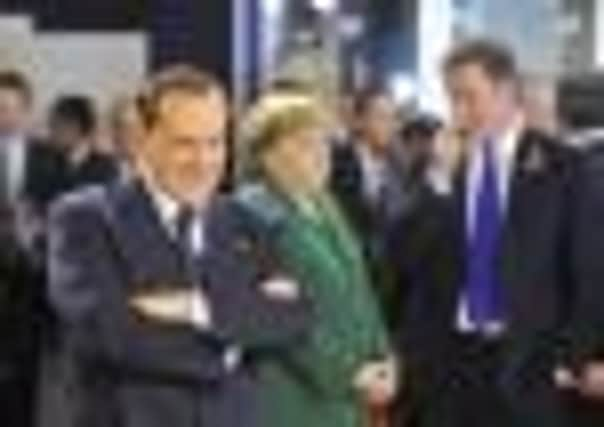Knives are out for Silvio Berlusconi as Italy creeps closer to abyss


But he dismissed reports yesterday that he was considering stepping down in favour of early elections, saying they were “without foundation”.
However, the prospect of financial disaster looms large because of Italy’s huge debts and slow growth. Unlike Greece, Ireland and Portugal – the three countries that Europe has already bailed out – Italy’s economy could be too large to rescue.
Advertisement
Hide AdAdvertisement
Hide AdInvestors want the government to quickly pass measures to boost growth and cut debt. But defections from Mr Berlusconi’s coalition government mean he no longer commands enough loyalty to pass the reforms.
Increasingly, Mr Berlusconi is himself being seen as the problem.
If he should resign or lose a confidence vote, president Giorgio Napolitano would decide whether to call early elections, or name a government of technocrats rather than politicians.
The most widely discussed name to lead a technical government is Mario Monti, a former EU competition commissioner.
The opposition centre-left has long demanded the resignation of Mr Berlusconi, citing sex scandals, criminal prosecutions and legislative priorities it says are aimed at protecting his own business interests rather than those of the country.
However, it has failed to come up with a leader who can energise the base and create a credible programme, leaving the opposition divided and rudderless.
The ultimate fear is that Italy cannot pay for its £1.6 trillion debt and needs international help. Europe would struggle with a bail-out that large, meaning a default that could break up the 17-nation eurozone and drag down the global economy.
The yield on Italy’s ten-year bonds jumped to 6.67 per cent, its highest level since the euro was established in 1999 and uncomfortably near the 7 per cent threshold that forced both Ireland and Portugal to accept bail-outs.
Advertisement
Hide AdAdvertisement
Hide AdAs yields rise, governments must devote more of the national budget simply to paying interest costs, creating a vicious circle of debt. Mr Berlusconi had lunch with his children and friends at his villa near Milan yesterday, sparking Italian media to speculate he was devising an exit strategy.
But the lunch is a family tradition and his Facebook page said “the reports of my resignation are without foundation”.
Public administration minister Renato Brunetta, a Berlusconi loyalist, acknowledged that the government has a “numbers problem” in parliament and if a majority is lacking then “everybody goes home”.
Interior minister Roberto Maroni agreed, adding “it is useless to persist.”
But Mr Berlusconi has remained defiant, insisting he still commands enough support in parliament.
“I don’t understand how rumours of my resignation are circulating,” he said.
Opposition leader Pierluigi Bersani said MPs are planning a confidence vote which analysts say could come as early as today.
Mr Berlusconi has pledged to call one himself to prove his majority stands, possibly next week, on reforms and other stopgap measures to lower Italy’s debt.
Advertisement
Hide AdAdvertisement
Hide AdThe reform measures include a plan to sell government assets and tax breaks to reduce youth unemployment of 29 per cent and to get women back into the workforce in a country where just 48 per cent of women have jobs.
The legislation would also allow shops to stay open on Sundays and open up closed professions.
Mr Berlusconi has also pledged to raise the retirement age to 67 for all to match European trends, despite the fierce resistance of his allies in the Northern League, on whom Mr Berlusconi relies to govern. The leader of Italy’s largest labour confederation, meanwhile, predicted 2012 will be a “terrifying” year for the economy even if Mr Berlusconi leaves power.
CGIL leader Susanna Camusso also condemned Mr Berlusconi’s anti-crisis plan as containing virtually nothing to spark economic growth.
“I hope there will be (early elections), and that they will be soon for the good of the country,” she said.
Mario Draghi, an Italian who just took over as European Central Bank president, said last week that since joining the euro, Italy has enjoyed unnaturally low interest rates for years because its monetary policy has been linked to that of stronger economies like Germany.
“For a long time spreads between sovereign bonds in the euro area were very narrow,” he said. “They did not reflect the different realities of different countries.”
In contrast, German borrowing costs hit a record low yesterday, as investors fled to their bonds as a safe haven in Europe.
Advertisement
Hide AdAdvertisement
Hide AdJames Walston, professor of political science at the American University of Rome, said Mr Berlusconi’s time is quickly running out, even though elections are not due until 2013.
“He could go tomorrow. He could go next week. The sort of pressure he is under, coming from his own people, will make it sooner than later,” he said.